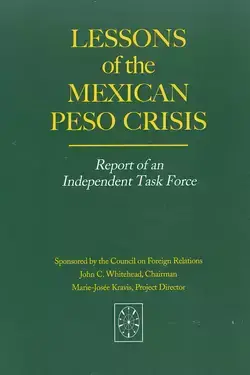
Lessons of the Mexican Peso Crisis

- Task Force Report
- Analysis and policy prescriptions of major foreign policy issues facing the United States, developed through private deliberations among a diverse and distinguished group of experts.
What the United States and the international community have done for Mexico is unique. No other country, with the exception of Canada, could muster such support from the U.S.government. The Mexican peso crisis, therefore, is not a bell weather of currency troubles in emerging economies or a model of how such problems are likely to be handled.
The task force of leading scholars, business people, and policy analysts assembled by the Council on Foreign Relations views the causes of Mexico's problems as primarily domestic. It warns that the type of massive international support to other countries, as suggested by the U.S. Treasury Secretary Robert Rubin, could dampen their commitment to domestic reform in Mexicoand other emerging economies, and finally assesses the ability of the international financial system to deal with Mexico-style financial implosions.
More on:
The report concludes that "all parties would be wise to be mindful of the market, those who would intervene should bear the burden of proof."
Several years ago, on December 20, 1994, the Mexican government responded to a looming liquidity crisis by devaluing the peso, thereby unleashing financial turmoil on a global scale. Since then, a reexamination of the events surrounding the peso devaluation has intensified rather than resolved the debate about the management of currency crises in emerging economies. Interventionists believe more strongly than ever that governments and international institutions can and should play a central role in preventing or stemming such financial implosions. Free marketeers have reaffirmed their basic conviction that sound domestic policies which reflect market forces are the most effective remedy for dealing with these situations and disciplining mishandlers. Yet, despite their enduring
contention on policy fundamentals, interventionists and free marketeers have found some important common ground as a result of the peso crisis. They agree that developing countries should be far more vigilant over budget and trade deficits, loose bank credit, low domestic savings, and excessive reliance on foreign investment to fuel domestic consumption, as opposed to capital formation. They agree that the international community and private investors must demand far greater openness on the financial affairs of developing countries and that international institutions should improve their surveillance.
Equally important, neither contending party sees the Mexican peso crisis as a bellwether of currency troubles in emerging economies or as a model of how such problems are likely to be handled.
xico-style
More on:
 Online Store
Online Store